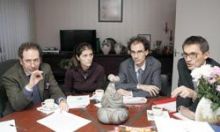“Geopolitics, reconciliation, and remembrance” is the topic of a large-scale international conference involving some leading European scholars that is to be held in Kyiv on December 4-6. The conference was initiated by the French and Polish embassies. Among its organizers are such institutions as the French Cultural Center, the National Academy of Science of Ukraine, and the Institute of National Memory.
In this connection The Day‘s office hosted a meeting of the organizers. The participants included George Mink, Scientific Director of the French National Research Center and one of the conference speakers, Guillome Caulen, Attache for Scientific and University Cooperation of the French Embassy, Guillome Narjolle, First Secretary of the French Embassy, and Larysa Ivshyna, The Day‘s editor in chief. The Day had earlier supported the idea to organize the conference and had become the organizers’ informational partner.
The topic of the conference is has not been chosen at random, and it is no coincidence that it is being held in Ukraine. Deep in the mass consciousness of our society is the conviction that the problem of morbid historical memory is a purely Ukrainian phenomenon because our history is one of the most dramatic ones, and it is hard to overcome our psychological inertia.
Conference participants are going to talk about the problems of historical memory in their countries. Europeans also had (and some still have) distortions in understanding their own history and national identities. Was it easy for the French to live with the post-colonial syndrome and learn lessons from the Franco-Algerian confrontation? Didn’t Germans have a nationwide psychological drama after their defeat in the Second World War? Aren’t they uncomfortable about the fall of the Berlin Wall? The world is overflowing with dramas, and nations need each other’s experience.
European scholars see discrepancies in the way history is understood in the countries of so-called “old” Europe and in the new EU member countries. First, Western Europe has gone far ahead in solving the problems of historical memory. Second, the historical paths of Western Europe and Eastern Europe are just too different. The aim of the conference is to bring the historical contexts of all European countries closer together. As George Mink said, to “invent” a European citizen we have to unite historical memories of different nations.
The organizers emphasize that the conference is focused exclusively on research issues and is not pursuing any political goals. “Let the history keep its autonomy,” says George Mink. “Let politicians deal with politics, and leave history to historians, writers, and journalists.” This is indeed an important piece of advice from the French scholar.







